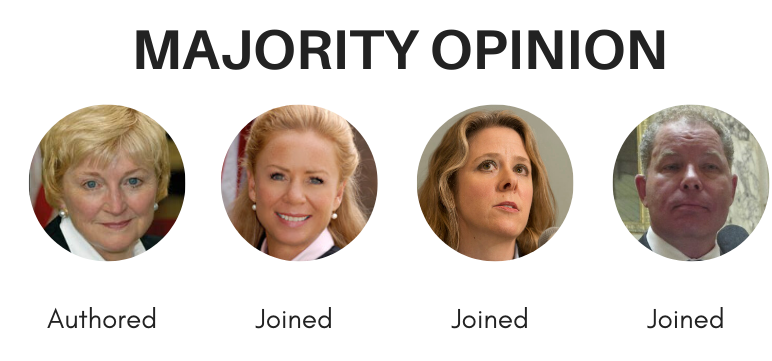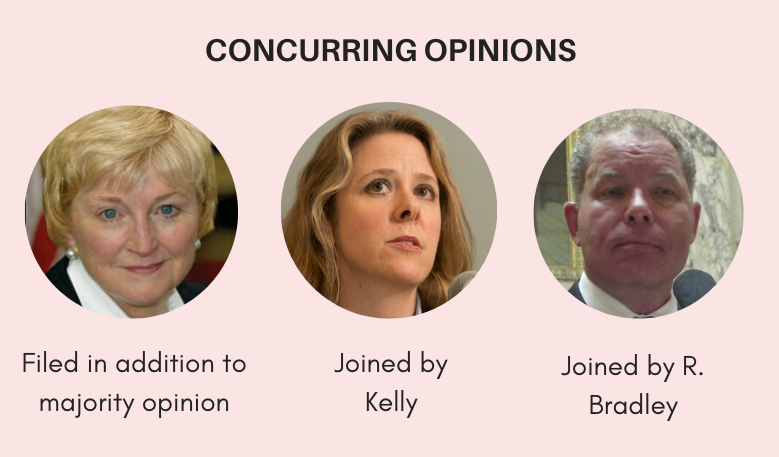The Wisconsin Supreme Court justices filed seven separate opinions in their decision on Wednesday striking down the state’s extended stay-at-home order.
A 4-3 ruling issued on Wednesday essentially reopened the state immediately, though several local governments have already enacted their own health restrictions to help slow the spread of the coronavirus. Schools statewide also remain closed.
The high court’s majority ruled that Department of Health Services Secretary Andrea Palm overstepped her authority by extending the statewide stay-at-home order for another month. The majority opinion declared Emergency Order 28 unlawful, invalid and unenforceable.
The 161-page document with the decision includes seven opinions — the majority opinion, three concurring opinions and three dissenting opinions.

Majority Opinion
In the majority opinion, Chief Justice Patience Roggensack wrote the case was about Palm’s asserting power as an unelected official. She said the majority concluded the emergency order is a rule under the controlling precedent of the state Supreme Court, and therefore, is subject to statutory emergency-rulemaking procedures established by the Legislature.
“Accordingly, the rulemaking procedures of Wis. Stat. § 227.24 were required to be followed during the promulgation of Order 28,” Roggensack wrote. “Because they were not, Emergency Order 28 is unenforceable.”
Discussion around Wisconsin Stat. § 227.01(13) (rulemaking)
- “We conclude that Order 28 is a ‘general order of general application.’ The order regulates all persons in Wisconsin at the time it was issued and it regulates all who will come into Wisconsin in the future. If we were to read the definition of ‘Rule’ as Palm suggests, one person, Palm, an unelected official, could create law applicable to all people during the course of COVID-19 and subject people to imprisonment when they disobeyed her order. “
- “In addition, we employ the constitutional-doubt principle. That is, we disfavor statutory interpretations that unnecessarily raise serious constitutional questions about the statute under consideration. Clark v. Martinez, 543 U.S. 371, 380-81 (2005). Palm points to statutes that she asserts give her broad authority to impose regulation; but it does not follow she can impose regulation without going through a process to give the people faith in the justness of the regulation. However, under Palm’s theory, she can ‘implement all emergency measures necessary to control communicable diseases,’ Wis. Stat. § 252.02(6), even at the expense of fundamental liberties, without rulemaking. That interpretation is constitutionally suspect.”
Discussion around Wisconsin Stat. ch. 252 (communicable diseases)
- “If Wis. Stat. § 252.02(6) were the sole factual foundation for criminal charges, no criminal prosecution could result because § 252.02(6) does not have the specificity required for fair notice of the conduct required or prohibited. Stated otherwise, it has no definable standards for required or prohibited conduct.”
- “We do not define the precise scope of DHS authority under Wis. Stat. § 252.02(3), (4) and (6) because clearly Order 28 went too far. We cannot expansively read statutes with imprecise terminology that purport to delegate lawmaking authority to an administrative agency.”
Regarding the Legislature’s request to issue a stay of a temporary injunction for six days
- “Although a very unusual request … We perceive this request as being grounded in a concern for an orderly transition from Order 28 to a lawful rule.”
- “However, more than two weeks have passed since we began our consideration of this case. Therefore, we trust that the Legislature and Palm have placed the interests of the people of Wisconsin first and have been working together in good faith to establish a lawful rule that addresses COVID-19 and its devastating effects on Wisconsin.”

Concurring opinions
Chief Justice Roggensack
Roggensack filed a concurring opinion addressing the Legislature’s stay for the requested injunction. She said there was a legal basis upon which to consider the “extraordinary request.”
“I too am appreciative of the concerns raised by COVID-19 and the possibility of throwing the state into chaos,” Roggensack wrote. “Accordingly, although our declaration of rights is effective immediately, I would stay future actions to enforce our decision until May 20, 2020.”
However, she said she trusted the parties would put the interests of Wisconsinites first and work together quickly to establish a rule in response to COVID-19.
Justice R. Bradley
Justice Rebecca Bradley discussed what she viewed as constitutional violations in her concurring opinion. She brought up the discussion of Korematsu v. United States during oral arguments, and she said the point was not to compare the situations of Japanese-Americans forced into internment camps during World Ward II with those faced by people ordered to stay at home because of the coronavirus.
“We mention cases like Korematsu in order to test the limits of government authority, to remind the state that urging courts to approve the exercise of extraordinary power during times of emergency may lead to extraordinary abuses of its citizens,” Bradley wrote.
She said the court was aware that many Wisconsinites support Safer at Home, but she said it was making a decision based on the law, not popular opinion.
“In Wisconsin, as in the rest of America, the Constitution is our king——not the governor, not the legislature, not the judiciary, and not a cabinet secretary,” Bradley wrote. “Fear never overrides the Constitution. Not even in times of public emergencies, not even in a pandemic.”
Justice Kelly
Justice Dan Kelly said he wrote separately to describe why, under Wisconsin’s constitutional form of government, the Legislature couldn’t have given Palm the authority to issue the order.
He said the order contains or assumes “some shockingly profound policy decisions.” According to Kelly, the order asserts there has been a public policy decision to vest executive power in the secretary.
“If her authority is that boundless, there is no method by which we can determine what power she might assert next,” Kelly wrote. “Can she also dictate what we do in our own homes? Can she tell us how many hours we can spend outdoors in our own yards? Can she forbid us from buying certain products? Compel us to buy others?”

Dissenting opinions
Justice Dallet
In her dissent, Justice Rebecca Dallet said the majority failed to examine the plain language of Wis. Stat. § 252.02. She said the legislature gave the DHS secretary the explicit authority to issue the order.
“The majority’s attempts to circumvent the statute’s plain meaning in order to reach its desired outcome are legally suspect and, frankly, unpersuasive,” Dallet wrote. “This reading of Wis. Stat. § 252.02 is even more illogical because it hamstrings DHS to a time-consuming, lengthy rulemaking scheme inconsistent with the authorization for DHS to immediately and summarily” to guard against the introduction of communicable disease as well as to control and suppress it.
Counsel for the Legislature said the rulemaking process could take 12 days in this case.
“This decision will undoubtedly go down as one of the most blatant examples of judicial activism in this court’s history,” Dallet wrote. “And it will be Wisconsinites who pay the price.”
Justice A.W. Bradley
Justice Ann Walsh Bradley said she wrote a separate dissent to discuss the “confusion” resulting from Roggensack’s majority and concurring opinions about the issue of the stay.
“These positions taken in the majority opinion and the concurrence are fundamentally contradictory,” Walsh Bradley wrote. “If you are confused, you are not alone.”
Roggensack provided a fourth vote to form a majority to deny the requested stay, but Walsh Bradley said if Roggensack actually wanted the stay, as she said in the concurring opinion, she would have been the fourth vote to form a majority in support.
“It is illogical to vote to deny a stay, while at the same time lamenting that because of the way you voted, there is no stay,” Walsh Bradley wrote.
Justice Hagedorn
Justice Brian Hagedorn said he would have upheld the order based on the legal issues presented in the case. He said the court’s task was to decide the specific arguments of the case, not decide the constitutional limits on executive power or whether the order infringed on constitutional rights.
He said the order was temporary and meant in response to the outbreak of a disease, meaning it didn’t meet the definition of a rule under Wis. Stat. § 227.01(13). The Legislature never argued one of its laws was unconstitutional, Hagedorn said, although the majority seemed to make that argument.
“The rule of law, and therefore the true liberty of the people, is threatened no less by a tyrannical judiciary than by a tyrannical executive or legislature,” Hagedorn wrote. “Today’s decision may or may not be good policy, but it is not grounded in the law.”
Walsh Bradley and Dallet joined in paragraphs 198-258 of his dissent.
Critiques of opinions
The justices included a number of critiques of the logic and arguments in each other’s opinions, including:
“Spurning more than two centuries of fundamental constitutional law as well as the Wisconsin Constitution’s guarantee of liberty, Justice Brian Hagedorn shockingly proclaims ‘the judiciary must never cast aside our laws or the constitution itself in the name of liberty.’ Setting aside the self-contradictory nature of that statement, Justice Hagedorn’s 53-page opinion contains no constitutional analysis whatsoever, affirmatively rejects the constitution, and subjugates liberty. The Wisconsin Constitution IS the law——and it reigns supreme over any statute.” R. Bradley wrote.
“In a thinly-veiled attempt at garnering a sensationalized headline, Justice Rebecca Dallet repeatedly employs fear tactics in lieu of the law in order to dramatize her perceptions of the consequences of the majority’s opinion,” R. Bradley wrote.
“The whole of (Hagedorn’s) statutory analysis is faulty because he has not discerned that the Order implicitly created, or assumed to exist, a host of public policy decisions. Under Justice Hagedorn’s rationale, an executive branch agency is free to make ad hoc policy decisions, so long as they are temporary and acted upon immediately. Nothing in our legal canon supports such an odd proposition,” Kelly wrote.
“A majority of this court falls hook, line, and sinker for the Legislature’s tactic to rewrite a duly enacted statute through litigation rather than legislation,” Dallet wrote.
“Some members of the majority try to get around this by asserting that Order 28 violates the nondelegation doctrine under a legal test raised and developed sua sponte without the benefit of adversarial briefing. Even assuming this new legal framework is correct and should be adopted, the rationale offered does not support the suggested conclusion,” Hagedorn wrote.
In response, Kelly wrote, “I have no need to ‘get around’ this observation because in this court we don’t let the tail wag the dog. Justice Hagedorn is concerned about remedies when what we are concerned about is enforcing a structural limitation on the branches’ powers. It would be irresponsible of us not to consider constitutional limitations when we declare what the law is.”



